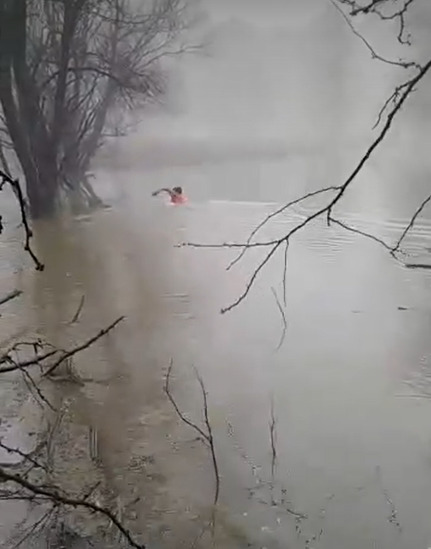The respondent is a young Pakistani man. On the 22nd of December of 2021, he and his four friends left Bihac and started to walk to reach Italy. Long days of walking were ahead of them. They carried heavy backpacks with food, water and all was necessary to survive that long journey.
After seven days spent walking, they encountered a river, and they crossed it without any problem, despite the cold. Three hours later, on their way, another river. At first it did not seem dangerous; the current was not too fast, and they had to keep on going, so they decided to swim across the river. One by one, they crossed it. Even if did not look like, the water was deep, and at some point you could not walk anymore, you had to be able to swim.
I., one of the five guys, twenty-four years old from Pakistan, was the last to go. His friends were waiting for him on the other side. The water was extremely cold, and he was not a good swimmer, the current was stronger than they would have expected. His muscles paralyzed; he could not move anymore. He tried to hold onto a branch with all his strength, but, despite his best efforts, the branch broke. He sank into the freezing water, and he drowned. His friends tried to save him, they went back into the water to rescue him, but there was nothing to do: he could not be found. The respondent tries to explain the sense of powerlessness, shock, and fear of that moment, but it is something impossible for him to describe. He and his friends searched for I. for several hours, but the riverside was flooded, and the terrain was difficult to explore: there was no way of finding him, no matter how much they tried.

Worn out, they walked in the muddy forest, all wet, to the closest road, and shouted for help. No car stopped, so they decided to reach to the nearest village, three hours away from the place where they lost I.. The respondent says that, in the forest, the mud was so much that it covered their legs almost to the knees. They had a phone with them, to guide them, but no credit or internet, so they did not know how to call for help.
When in town, they knocked on a door and ask a Croatian man to call the police. Twenty minutes later, five police officers with two white vans and one grey car arrived. The police asked: “How many people are you?” They said:” We are five”. One policeman asked: “You miss one guy, where is he?” They cried: “Please help us, he lost is life, his body is in the water, help us, we have the exact location where it happened”. The police made fun of them, saying: “This happens a lot of times around here, go away. This is what happens when you try to come to Europe”. They were crying, but the police officers did not help them. The respondent clearly affirms that police believed what happened, but they did not care about it.
After that, they were pushed inside a van. They were not taken to any police station, nor had the possibility to ask for asylum. The police drove for approximately six hours, until they reached the Croatian-Bosnian border. When they were let out of the van, one of the policemen told them: “Try next time”.
They wanted to ask for asylum, but they explain: “If we asked for asylum, they would think that it is an excuse, that we are telling a lie about our friend, just because we want to get asylum from me, they would think that we are lying”. Devastated, they tried to go to another police station, of which they do not remember the name, where some police officer just asked for their phone number and said that in case they had news they would have let them know. At this point, shocked, in fear, cold and without their dear friend, they had to walk for at least ten hours to get back to Bihac, where they had to communicate the horrible news to everybody, including I.’s brother in Pakistan. While writing this report, a lot of time has passed, but still Croatian authorities were not able to find I.’s body, without which his family is not even given the right to grieve for his loss with the dignity that he would deserve.
